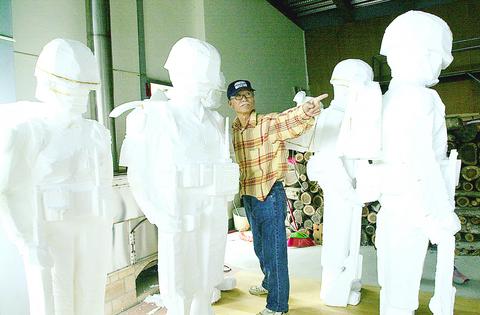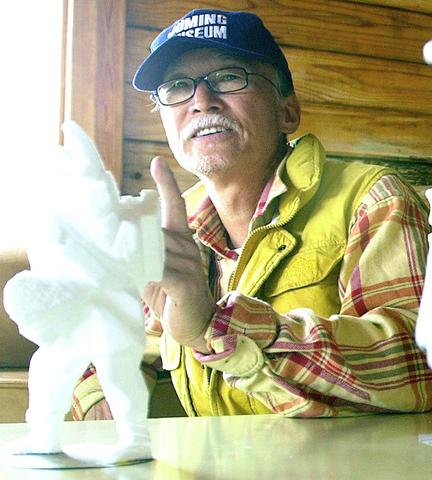These days, few things can stir Ju Ming (
Confining himself to his wood cabin and studio near Ching-ching Dairy Farm
In retreat from the distractions of city life, Ju hopes to finish "the biggest show of my life" -- an army of 300 life-sized figures -- modern Taiwanese troopers with all their equipment, including planes and a battleship. (The battleship will be built from wire, but will be the same size as the real thing.) A related work, which is part of the same project, is 60 soldiers representing the retreat of the KMT's army in 1949.

PHOTO: GEORGE TSRONG, TAIPEI TIMES
Easily Taiwan's best-known artist -- having created the ubiquitous Tai Chi series of sculptures -- Ju Ming started life as a humble temple sculptor. It was a search for a personal style that brought him into contact with the late Yang Ying-feng (楊英風), under whom he studied.
Ju held his first solo exhibition at the National Museum of History (
In January, the prestigious French publisher Editions Cercle D'Art released a book on Ju's works titled simply Ju Ming. Last week, he received an honorary doctorate from Fu Jen Catholic University (

PHOTO: GEORGE TSRONG, TAIPEI TIMES
Despite this recognition of his artistic achievement, Ju isn't resting on his laurels. "I try to hide from the busy social life in Taipei because it disturbs my work. Living in Taipei troubles your mind. Even if you don't go out and no one is visiting you, you can't find tranquility. It is impossible to work seriously like that," Ju said.
Ju, who is known for his avoidance of publicity, has, in the last decade, rarely shown up even for the opening of his own exhibitions.
Despite advancing years -- he is now in his late 60s -- Ju maintains a rigorous work schedule. When working on a project, he lives the life of a monk. "Except for sleep, all I do is sculpt," Ju said. Every morning, Ju also practices tai chi, which he has done religiously for 35 years. He first began to study tai chi on the suggestion of his mentor, Yang, who thought Ju not physically strong enough to be a sculptor.
"After breakfast, I work on my sculptures until sunset. Only when it became so dark I cannot see do I go indoors and call it a day," Ju said.
Ju works outside his 200-ping two-story studio where he can hear the sound of birds and see the wide expanse of tea plantations.
"Even when I'm not working, my mind is on my sculptures. Every night I think about ways I can improve the pieces I am working on," Ju said.
In his studio, several Styrofoam soldiers stand to attention. These figures await casting in bronze when they will become part of his National Troops series.
"They all look different. Their height and the shape of their faces are all different," Ju said in excitement, moving some of them forward to show the different equipment they carry. "This one is my company captain," said Ju, pointing to one figure with its mouth open wide. A name was written above his shirt pocket. "That's his name. He's shouting orders to the soldiers because officers are coming," said Ju, describing the scene as though it were taking place before his eyes.
"These soldiers listen to nobody but me. I'm the commander. I give them titles, provide them with warships. I even clothe them," Ju said.
Next September, on the fifth anniversary of his Museum's opening, the National Troops series will be installed there. Ju hopes the president will attend the event to give a "military review" so that they can become real soldiers.
The 60 figures representing KMT troops that he is also currently working on present a sad scene of a retreating army in the face of communist forces in the late 1940s. Two figures have already been completed in bronze, while others are still in Styrofoam.
In creating the dispirited, crippled and ill-equipped soldiers, Ju is fulfilling a promise he made over 20 years ago.
"I was in Rome for two months to help with the shooting of a movie. Wei Shu (
"They could not possibly win and yet had to fight. Nobody knows how helpless they were. He asked me to let people know about their story through my work," Ju said. "At the time I was so moved I promise to do this. But I never had the occasion to do such a big project until now."
"People say that life is a play. If that's true, then my museum is my stage and this project is the biggest play of my life," Ju said. The monumental sculpture, which Ju expects to finish within three years, is exceptional in scope. The total weight will be around 100 tonnes and will cost him NT$30 million. Already in serious debt after the construction of his museum, Ju once again shows he is willing to risk everything to accomplish what he thinks he has to.
In the spring sunlight outside his studio, Ju demonstrates how he works. Picking up a saw, Ju carves away in rapid movements. In a matter of minutes, a Styrofoam block is shaped into a soldier straining to push a cart of rations.
"Every slash is confident. Every cut matters. That's just me," he said.

In the March 9 edition of the Taipei Times a piece by Ninon Godefroy ran with the headine “The quiet, gentle rhythm of Taiwan.” It started with the line “Taiwan is a small, humble place. There is no Eiffel Tower, no pyramids — no singular attraction that draws the world’s attention.” I laughed out loud at that. This was out of no disrespect for the author or the piece, which made some interesting analogies and good points about how both Din Tai Fung’s and Taiwan Semiconductor Manufacturing Co’s (TSMC, 台積電) meticulous attention to detail and quality are not quite up to

April 21 to April 27 Hsieh Er’s (謝娥) political fortunes were rising fast after she got out of jail and joined the Chinese Nationalist Party (KMT) in December 1945. Not only did she hold key positions in various committees, she was elected the only woman on the Taipei City Council and headed to Nanjing in 1946 as the sole Taiwanese female representative to the National Constituent Assembly. With the support of first lady Soong May-ling (宋美齡), she started the Taipei Women’s Association and Taiwan Provincial Women’s Association, where she

It is one of the more remarkable facts of Taiwan history that it was never occupied or claimed by any of the numerous kingdoms of southern China — Han or otherwise — that lay just across the water from it. None of their brilliant ministers ever discovered that Taiwan was a “core interest” of the state whose annexation was “inevitable.” As Paul Kua notes in an excellent monograph laying out how the Portuguese gave Taiwan the name “Formosa,” the first Europeans to express an interest in occupying Taiwan were the Spanish. Tonio Andrade in his seminal work, How Taiwan Became Chinese,

Mongolian influencer Anudari Daarya looks effortlessly glamorous and carefree in her social media posts — but the classically trained pianist’s road to acceptance as a transgender artist has been anything but easy. She is one of a growing number of Mongolian LGBTQ youth challenging stereotypes and fighting for acceptance through media representation in the socially conservative country. LGBTQ Mongolians often hide their identities from their employers and colleagues for fear of discrimination, with a survey by the non-profit LGBT Centre Mongolia showing that only 20 percent of people felt comfortable coming out at work. Daarya, 25, said she has faced discrimination since she